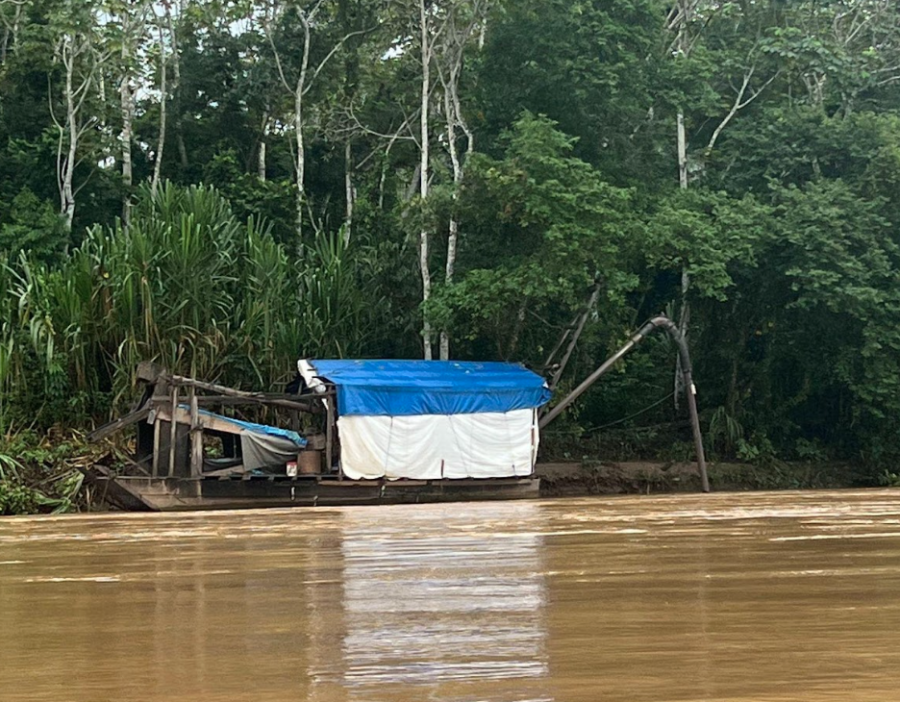Dirty Gold
August 24, 2022
After staying in the park for another ten days, the group once again boarded a boat for a journey down the Manu River. They traveled downriver for two days, seeing only untouched wilderness. But the moment they crossed the border to exit Manu National Park, the river transformed.
Trash floated in the water. On the banks were huge piles of stones, remnants of illegal gold mining. Gaps in the forest canopy were frequent, huge plots of land completely cleared to make way for gold miners. Periodically, the group would pass a group of miners actively working along the river’s edge, a testament to the almost nonexistent enforcement of mining regulations.
Gold mining has plagued the Peruvian Amazon, largely due to a lack of government crackdown. This has not always been the case — in early 2019, the Peruvian government launched Operation Mercury, a program sparked by the newly publicized knowledge that gold mining was releasing huge amounts of toxic mercury into the air.
The program initiated a wave of military interventions in the Madre de Dios region to apprehend illegal gold miners and shut down their camps. These areas were hotbeds for other crimes, including gang activity, child labor and human trafficking.
Operation Mercury was a huge success, resulting in a 92% decrease in illegal gold mining activity, according to Amazon Conservation. However, three years later, the region has regressed.
Political shifts and a lack of broad support for the initiative have allowed illegal miners to retake the Madre de Dios. Thousands returned to the region with no one standing in their way, once again threatening the fragile Amazonian ecosystems and local public health.
There exists a process for miners to become officially formalized by the government, but due to low enforcement, there is little incentive for them to do so. Gold buyers even prefer to purchase illegally mined gold, as they are more familiar with the appearance of nuggets formed using mercury.
Wake Forest’s Center for Amazonian Science and Innovation, or CINCIA, was founded to combat these issues, aiming to serve as a reliable source of information on environmental issues in Peru. The NGO’s goals include reforesting damaged lands, providing research and education on mercury, and helping the mining process become more environmentally friendly.
“We do good, hard science here at CINCIA,” Dr. Carol Mitchell, deputy project director of CINCIA, said. “We are here to provide information; we are not an activist group. You can pick at science all you want, but it’s going to tell you the same thing.”
CINCIA has made efforts to engage with formalized gold miners in Madre de Dios to experiment with recovery options for destroyed land. There are thousands of gold miners, and only about 30 are currently formalized. CINCIA works with about 15 of them.
“The idea is not to say, ‘Oh, you’re a bad person because you’re a miner,’” said Cesar Ascorra, national director of CINCIA. “The idea is, ‘Mining has negative impacts, let us work with you to try to solve them.’”
After an area of land has been clear-cut and mined, the soil becomes nutrient-poor, making it extremely difficult for the forest to reclaim. CINCIA has developed an effective recovery strategy for deforested lands, using the shells of the common Brazil nut.
The group has found a cheap and effective way to make these nutshells the ideal fertilizer. According to CINCIA researchers, this burnt Brazil nut fertilizer, or ‘biochar,’ can remain in the soil for hundreds of years, playing host to various species of microbes that are responsible for fertilization.
Biochar has proven to be effective in field research experiments, drastically improving the growth of plant life in areas affected by mining. This recovery is critical to regenerating fractured ecosystems and preserving biodiversity.
Unfortunately, the effects of mining extend beyond reforestation. The rainforest is home to various Indigenous groups, who have faced immense struggle in making their voices heard by decision-makers.
